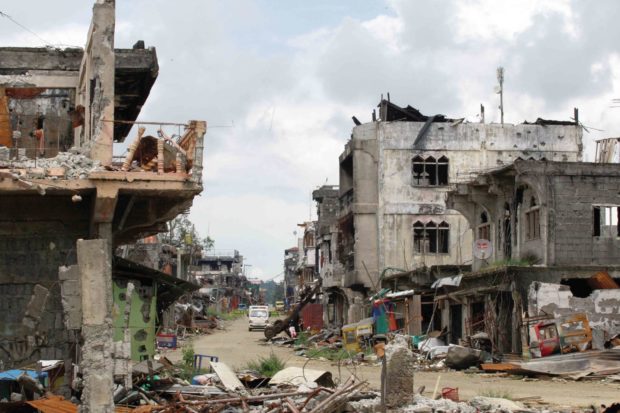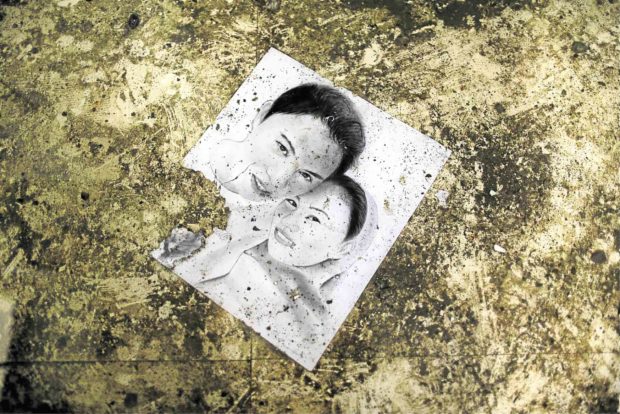56 more abuse cases in Marawi listed

The roads of Marawi are now lined with the ruins of houses, which human rights groups said were looted both by terrorists and soldiers. —JEOFFREY MAITEM
CAGAYAN DE ORO CITY — A Mindanao-based human rights group added 56 cases of alleged abuses committed during the war on terror in Marawi City to at least 309 cases that the Armed Forces of the Philippines agreed to investigate.
Reports of human rights violations in Marawi appeared to cast a shadow over the government celebration of victory over homegrown groups that sowed terror in the predominantly Muslim city in the name of Islamic State (IS).
The group Kalinaw Mindanao went on a fact-finding mission to Marawi, dubbed National Interfaith Humanitarian Mission, on Nov. 16 and 17, days after the government declared an end to IS’ campaign to establish another caliphate starting with its occupation of Marawi.
In a report distributed to media on Saturday, Kalinaw said the violations, which it attributed to the military, included indiscriminate firing, illegal arrest, harassment and intimidation, destruction of property, violation of domicile and theft or looting.
How about martial law?
Article continues after this advertisementAsked how there can be illegal arrests under martial law, Christine Palabay of the group Karapatan said martial law “does not and should not justify warrantless arrests” like the ones documented by Kalinaw.
Article continues after this advertisementThe group said at least 10 families reported pieces of property worth at least P56 million being destroyed in alleged indiscriminate airstrikes that targeted Maute group, which joined forces with Abu Sayyaf to set up an IS base in Marawi.
Bombs dropped by military planes landed on civilian structures that should have been spared from destruction, the group said.
Houses were looted and soldiers camped inside these, the group said. Residents discovered the looting when they inspected their homes after the war.

A house occupied by now dead Southeast Asia Islamic State emir Isnilon Hapilon yields a portrait of a couple who were presumed to be the home owners. —JEOFFREY MAITEM
A family that was not identified was quoted by the group as narrating how soldiers forced them to pay P3,000 just to be allowed access to their house in the village of Kilala just to inspect it. But after paying the P3,000, the family said they were still barred from checking their house.
Detention
Another family alleged that soldiers fired at them indiscriminately then detained them on suspicion of being Maute members.
International human rights mission delegates also condemned the US forces’ participation in the Marawi war and the US government’s continuing military assistance to the Philippine government, even under the Duterte administration that had threatened to cut off ties with the United States.
“The mission underscored the need to indemnify the victims of the Marawi crisis on the basis of the damage on their properties,” Kalinaw Mindanao said.
The Armed Forces, on Friday, said it would investigate the allegations against soldiers who fought in Marawi.
Maj. Gen. Restituto Padilla, AFP spokesperson, told reporters the military was committed to respecting human rights.
Padilla’s statement was made in reaction to a separate allegation by the international human rights group Amnesty International (AI) of abuses committed by both soldiers and terrorists.
Atrocities by both sides
The AI report, “The ‘Battle of Marawi’: Death and destruction in the Philippines,” described the human rights situation in Marawi at the height of the war.
It documented atrocities by terrorists who targeted Christians in their occupation of Marawi. Christians, the report said, were randomy executed, taken hostage and their houses looted at will.
The military, meanwhile, “detained and ill-treated fleeing civilians and also engaged in looting,” AI said in its report.
“Their extensive bombing of militant-held areas of Marawi City wiped out entire neighborhoods and killed civilians, highlighting the need for an investigation into its compliance with international humanitarian law,” it said.
“Marawi’s civilian population has suffered immensely amid one of the Philippine military’s most intensive operations in decades,” said Tirana Hassan, AI crisis response director. —Jigger J. Jerusalem